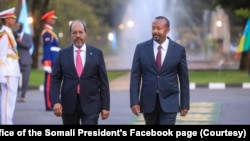Somalia announced that obstacles to Ethiopia's participation in the new African Union mission in Somalia (AUSSOM) have been overcome, and the final stage of the composition and size of Ethiopian forces is expected to be sorted out shortly.
Somalia previously threatened to expel Ethiopian troops from the African Union peacekeeping mission unless Ethiopia renounced its controversial memorandum of understanding (MOU) with Somaliland, the breakaway region of Somalia.
Under the terms of the MOU, Somaliland would lease about 20 kilometers (12 miles) of its Gulf of Aden coastline to landlocked Ethiopia’s naval forces and in exchange — according to Somaliland officials — Ethiopia would begin a process considering the official recognition of Somaliland’s independence.
However, Ali Omar Balcad, Somalia’s state foreign minister told VOA that the obstacles posed by the MOU, which had hindered Ethiopia's participation in AUSSOM, have now been overcome.
The minister said the current challenge lies in reallocating the number of troops assigned to AUSSOM, which were previously distributed to other countries.
"A Somali delegation will visit Ethiopia on Jan. 15, to proceed and finalize the technical details for their involvement and the number," Balcad told VOA.
Restoration of diplomatic ties
The development comes after a two-day visit by Somali President Hassan Sheikh Mohamud to Addis Ababa, during which he held discussions with Ethiopian Prime Minister Abiy Ahmed. The leaders agreed to mend diplomatic ties strained by Ethiopia's MOU with Somaliland.
"After in-depth discussions, Somali President Hassan Mohamud and Ethiopia's Prime Minister Abiy Ahmed have agreed to reestablish diplomatic relations," Balcad said in an interview with VOA.
"Somalia’s ambassador to the African Union in Addis Ababa will also serve as Somalia’s new ambassador to Ethiopia. In return, Ethiopia will send a new ambassador to Somalia and assign consular representatives to Hargeisa and Garowe," Balcad added.
The diplomatic relationship between the two nations was damaged last year when Somalia declared the MOU between Ethiopia and Somaliland to be "null and void" and a violation of its sovereignty.
The fallout led to the expulsion of Ethiopia's ambassador to Somalia and the order to close Ethiopian consulates in Hargeisa and Garowe, although both consulates continue to operate.
In a joint communique issued Saturday, the two leaders pledged to "restore and enhance" bilateral relations through full diplomatic representation. Both leaders emphasized that regional stability hinges on strong cooperation built on mutual trust and respect.
Turkey played a pivotal role in mediating between the two sides. Last month, President Recep Tayyip Erdoğan facilitated a meeting in Ankara between President Mohamud and Prime Minister Ahmed, where both parties reaffirmed their commitment to mutual sovereignty and territorial integrity in what is being called the Ankara Declaration.
The Somali minister said the trade, port access and sea routes are set to be key topics at a meeting scheduled for next month in Ankara, building on the discussions from last month's agreement.
Egypt and Red Sea tensions
Meanwhile, Egypt declared Saturday that it will not accept any military or naval presence in the Red Sea from non-bordering countries. The remarks, made by Egyptian Foreign Minister Badr Abdelatty during a news conference with his Somali and Eritrean counterparts, underscore Egypt's growing concerns over Ethiopia's regional influence.
“We will not allow landlocked countries to set up [a] military presence along the Red Sea. Such moves would affect the security arrangement in the deep waters,” Abdelatty said.
Somalia’s foreign minister Balcad told VOA he is aware of Egypt's remarks, emphasizing that Somalia is not directly involved in the Red Sea issue, as it does not share a border with the waterway.
The Bab-el-Mandeb strait connects the Red Sea to the Gulf of Aden which runs along Somalia’s coastline.
"We maintain independent relations with Cairo and Addis Ababa, and we don't believe one harms the other," Balcad said.
Falastine Iman contributed to this report.








